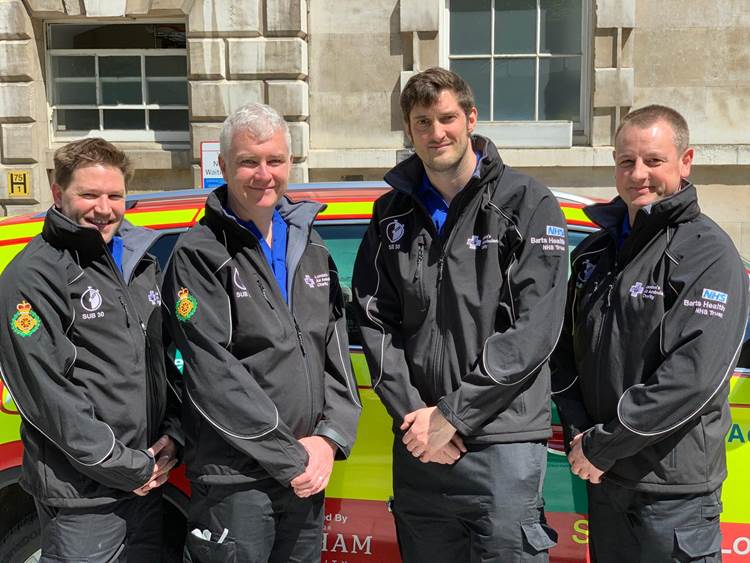UK-first trial gives hope of improving cardiac arrest treatment

A potentially ground-breaking clinical study is now underway at Barts Health NHS Trust, which could improve survival and recovery rates amongst the thousands of people who suffer a cardiac arrest outside of hospital every year.
Patients who suffer cardiac arrests outside hospitals unfortunately have very poor survival rates. Of the 4,389 patients that London Ambulance Service attempted to resuscitate last year, only nine per cent survived and were able to return home, despite the best efforts of emergency responders.
In hospital, some patients can be supplied with well oxygenated blood using a method called Extra Corporeal Membrane Oxygenation (ECMO) to keep their organs functioning whilst the cause of the cardiac arrest is treated; giving the patient the best possible chance of recovery.
Now, a team of experts from Barts Health NHS Trust, London’s Air Ambulance Charity (LAA) and London Ambulance Service (LAS) have joined together with Queen Mary University of London in a pioneering trial called ‘Sub30’, which aims to offer the same opportunity to suitable patients outside of hospital.
The Sub30 trial, which is funded by Barts Charity and London’s Air Ambulance Charity, will see ECMO taken out of hospital and used at the roadside for the first time in the UK.
The trial will assess whether patients who suffer an out-of-hospital cardiac arrest and remain in cardiac arrest after 20 minutes, despite the best efforts of emergency responders performing cardio-pulmonary resuscitation (CPR), can benefit from being placed on ECMO.
Simon Finney, Chief Investigator and ECMO Consultant at Barts Health NHS Trust said: "After 20 minutes of CPR, not only does the likelihood of a patient’s heart restarting dramatically decrease, but the risk of severe brain injury should they survive drastically increases.
 "That’s why we consider 20 minutes to be the critical point at which our intervention would be in the best interest of the patient.
"That’s why we consider 20 minutes to be the critical point at which our intervention would be in the best interest of the patient.
"Over the next year, we hope to learn whether or not it’s even possible for us to place suitable cardiac arrest patients on ECMO out of hospital and hopefully within 30 minutes of the 999 call.
"If we’re able to show it is possible then our next step would be to roll this study out on a larger scale and work out more formally if it helps improve outcomes for patients.”
A London’s Air Ambulance rapid response vehicle staffed by consultant doctors and a paramedic from London Ambulance Service will be on standby across the Barts Health Heart Attack Centre catchment area and respond to cardiac arrest emergency calls.
Carrying advanced equipment and treatments that are usually only found in hospital ECMO departments, the team will take the hospital to the patient to deliver this potentially life-saving intervention.
Patients’ organs will be supplied with pressured and oxygenated blood, giving the patient and the medical team time to transport them to the Heart Attack Centre at St Bartholomew’s Hospital, London where the ECMO can be continued and the reason for the cardiac arrest investigated without the concern of the brain and other organs deteriorating due to a lack of oxygen.
Ben Singer, Principal Investigator and ECMO Consultant at Barts Health NHS Trust and Consultant with London’s Air Ambulance said: “Less than one in ten cardiac arrest patients who collapse outside of hospital actually survive to get home.
"If it is not possible to restart a patient’s heart in the community, then the time it takes to get them into hospital means that in the vast majority of cases, their brain has already been starved of oxygen for at least an hour if not longer – even with all teams working as quickly and efficiently as possible.
"The high chance of very severe damage to their brain at that point means that we’re not able to place them on ECMO at the heart attack centre.”
As a pilot, the trial’s main aim is to prove with six patients if the concept is possible - that ECMO can successfully be delivered to a cardiac arrest patient who meets all the necessary criteria outside of the hospital setting. The team also aims to do this within 30 minutes.
If successful, the Sub30 ECMO trial will be the first in the world to achieve out-of-hospital ECMO within that timeframe – more than halving the length of time it currently takes other teams across the globe.
London Ambulance Service Medical Director Dr Fenella Wrigley said: “When a person goes into cardiac arrest, every second counts. This is especially true with out-of-hospital cardiac arrests.
"A person who suffers a cardiac arrest out of hospital should have the same chance of survival than if they were in hospital.
"We are delighted to be part of this collaborative trial which we hope could shed light on whether we could improve the outcomes of such patients using this innovative method.”
Francesca Gliubich, Director of Grants at Barts Charity said: “We are extremely proud to support this collaborative team as they embark upon such a ground-breaking pilot study, which should significantly improve survival outcomes for cardiac arrest patients in the community and beyond.
"The combined specialist expertise of the team and their unique geographical position in central London makes them best-placed to advance existing emergency treatment, and ultimately, significantly shape best practice world-wide.”
